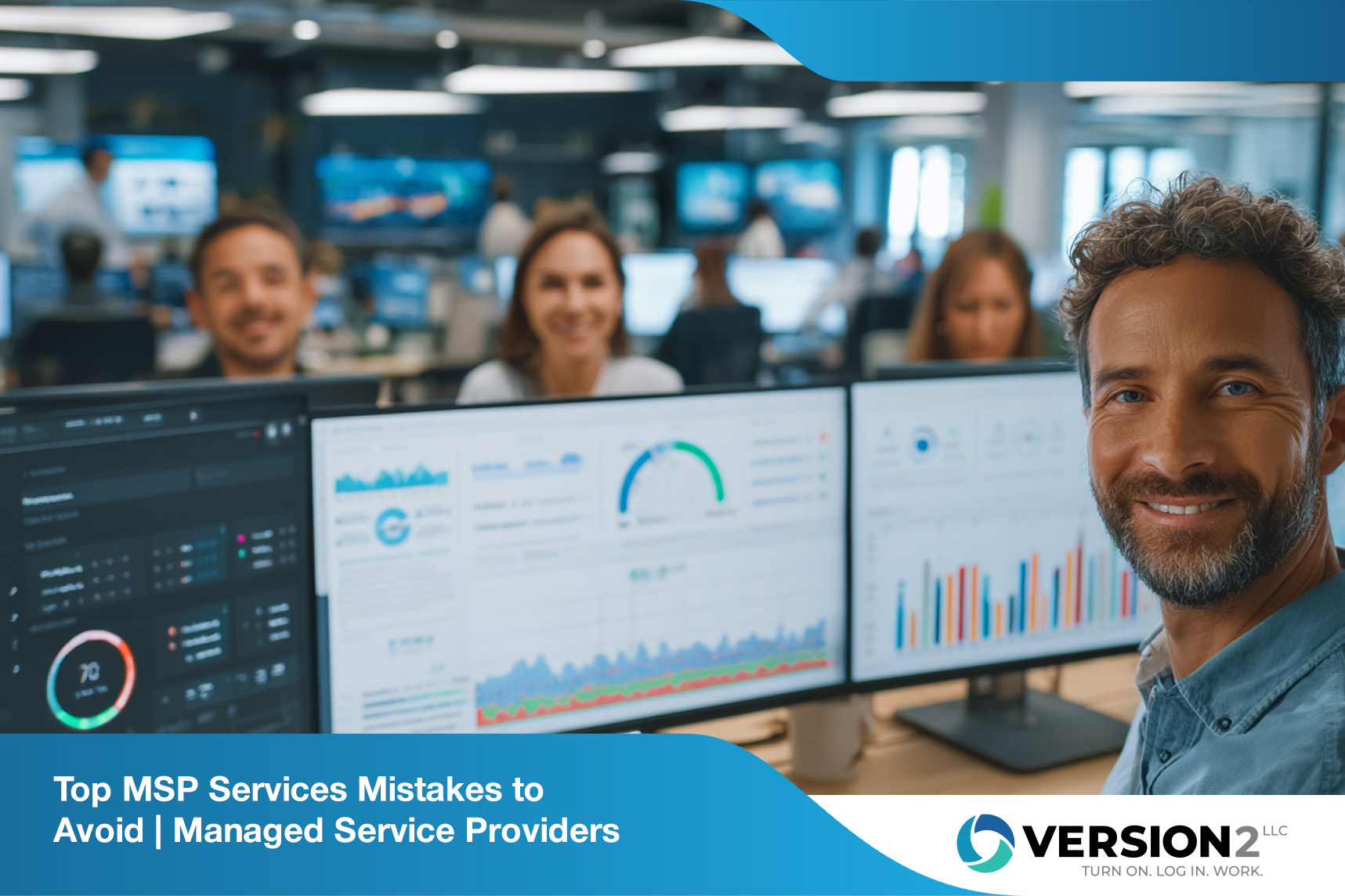
February 27, 2026
Top MSP Services Mistakes to Avoid | Managed Service Providers
Learn what MSP services include, common mistakes to avoid, and how to choose the right provider. Get practical tips to improve IT MSP services.
April 14, 2025

You didn’t start your business to lose sleep over cybersecurity and data privacy. But here you are — navigating client contracts, state laws, and late-night worries about data breaches or whether your cloud backup is actually backing up.
If it feels like the rules are changing faster than you can keep up — you’re right. Cybersecurity developments always evolve. Every headline about the latest cybersecurity attacks feels like a warning shot, reminding you how vulnerable your company’s sensitive data really is. And if you’re like most business owners, you’re not sure where your current IT setup stands in the grand scheme of compliance.
The real fear? Waking up to a cybersecurity incident you could have prevented — one that costs you not just money but trust, credibility, and precious time. It’s not just about installing antivirus software anymore. It’s about protecting your business from the ground up with the right tools, strategies, and people who actually get what’s at stake for you.
This guide is built for you — the decision-maker who’s tired of duct-taping IT solutions and just wants to know your business is safe, stable, and compliant. We’ll break down what really matters when it comes to cybersecurity and data privacy in Chicago, what you’re up against, and how to get ahead of it before something breaks.

The significance of cybersecurity and data privacy for businesses in Chicago cannot be overstated. As companies increasingly rely on digital platforms to manage operations, store sensitive information, and engage with customers, they become more susceptible to cyber threats. A single data breach can result in severe financial losses, legal repercussions, and a tarnished reputation.
Cyber threats are on the rise, and small to medium-sized businesses (SMBs) are often prime targets due to perceived vulnerabilities. In 2022, 96 companies in Illinois reported being victims of data breaches, a significant increase from 41 reported breaches in 2021. This upward trend underscores the escalating risk that businesses face in the region.
SMBs, in particular, face daunting challenges in the realm of cybersecurity. Studies have shown that 43% of cyberattacks are directed at small businesses. Alarmingly, 60% of small businesses that fall victim to a cyberattack go out of business within six months. These statistics highlight the critical need for robust data protection measures to ensure business continuity.
The financial implications of a cybersecurity incident can be devastating. Beyond immediate monetary losses, businesses may incur costs related to legal fees, regulatory fines, and remediation efforts. Furthermore, the erosion of customer trust following a data breach can have long-term detrimental effects on a company's reputation and customer retention.
Navigating the complex landscape of data privacy laws is crucial for businesses operating in Chicago. Both state and federal regulations impose specific obligations to protect consumer information and ensure compliance.
Illinois has enacted several laws aimed at safeguarding residents' personal information:
At the federal level, while there isn't a comprehensive data privacy law, several sector-specific regulations impact businesses:
The regulatory environment is evolving, with new laws being proposed to enhance privacy protection:

These days, Chicago businesses face many cybersecurity threats that can disrupt operations, compromise sensitive data, and inflict significant financial and reputational damage. Understanding these risks is the first step toward implementing effective defenses.
Ransomware remains a formidable threat, with cybercriminals encrypting critical business data and demanding payment for its release. Such attacks can lead to operational downtime, financial losses, and exposure of sensitive information. Implementing regular data backups, conducting employee training, and deploying robust endpoint protection are essential preventive measures.
Phishing schemes involve deceptive communications designed to trick employees into divulging confidential information or granting unauthorized access. These attacks often serve as entry points for further exploits. Regular staff training, multi-factor authentication (MFA), and advanced email filtering can mitigate these risks.
Cybercriminals may infiltrate a business by compromising less secure elements within its supply chain, such as third-party vendors or service providers. This tactic can lead to unauthorized access to sensitive data and systems. Conducting thorough vendor risk assessments and enforcing strict access controls are vital strategies to counteract these threats.
Threats originating from within the organization, whether intentional or accidental, pose significant risks. Employees or contractors with access to sensitive information may misuse it or inadvertently cause security breaches. Implementing comprehensive access controls, monitoring user activities, and fostering a culture of security awareness can help mitigate insider threats.
As businesses increasingly adopt cloud services, misconfigurations and inadequate security measures can expose them to data breaches and unauthorized access. Ensuring proper configuration, employing encryption, and regularly reviewing access permissions are critical to maintaining cloud security.
Relying on legacy systems and failing to apply timely software patches can leave businesses vulnerable to exploits targeting known weaknesses. Regularly updating and patching systems, as well as transitioning to supported hardware and software, can reduce this risk.
APTs are prolonged and targeted attacks where an intruder gains access to a network and remains undetected for an extended period, gathering sensitive information. Deploying advanced threat detection tools and conducting regular security audits can help identify and mitigate APTs.
The proliferation of IoT devices introduces additional entry points for cyberattacks, especially if these devices are not properly secured. Implementing strong passwords, regular firmware updates, and network segmentation can enhance IoT security.
Cybercriminals are leveraging artificial intelligence to develop more sophisticated attack methods, such as automated phishing campaigns and deepfake technology, making threats harder to detect. Employing AI-driven security tools to identify and mitigate these advanced threats is becoming increasingly important.

Building a resilient defense starts with a comprehensive, proactive approach to cybersecurity and data privacy. If you're a business owner in Chicago, chances are you're juggling multiple tech systems while trying to stay ahead of data protection laws, industry threats, and evolving privacy laws and regulations. Here's what a robust strategy should include:
Start with identifying what’s at stake. Conduct regular cybersecurity risk assessments to uncover vulnerabilities across your systems, applications, and third-party connections. An audit will help prioritize which data privacy and cybersecurity risks require immediate attention — from unpatched software to weak access controls.
Not all data is created equal. Classify sensitive data like customer records, employee data, and health data under strict access rules. Limit exposure by granting only the minimum access necessary — a critical step in preventing data security breaches.
Encryption should be a default layer of data protection — for cross-border data transfers, storage, and in-transit information. Your data should remain secure whether it's hosted locally, offsite, or in the cloud. Also, ensure proper data storage practices that comply with national data privacy standards.
No system is 100% breach-proof. A strong incident response plan helps your business act quickly and efficiently when a cybersecurity incident happens. This includes identifying the threat, containing the damage, notifying stakeholders (per data breach notification laws), and restoring operations.
The weakest link is often human. Regular training on how to prevent cybersecurity attacks, recognize phishing scams, and follow proper protocols is essential. Pair this with security awareness training to reduce the risk of insider threats and mistakes.
Leverage tools like antivirus software, firewalls, intrusion detection systems, multi-factor authentication, and continuous monitoring. Choose solutions that support cybersecurity standards established by bodies like the Cybersecurity and Infrastructure Security Agency (CISA).
Automate updates for operating systems and applications. The latest cybersecurity attacks often exploit known vulnerabilities — so keeping your systems up to date is one of the simplest but most critical ways to protect your business.
Cyber threats evolve — and so should your defense. A well-built strategy includes regular evaluation, updates, and testing of policies to ensure continued alignment with your business growth, tech stack, and legal obligations.
You’ve worked hard to build your business — and in this digital-first world, it’s your responsibility to protect what you've built. Not just from competitors but also from invisible threats that grow more sophisticated by the day. A single data breach can undo years of hard work, strain customer trust, and bury you in headaches you never saw coming.
You don’t need to navigate this alone. Whether you're improving your incident response plan, reviewing your data protection practices, or trying to make sense of cybersecurity and data privacy in Chicago, you don’t have to figure it out on your own. It might be time to partner with Version2.
With over 15 years of experience and a reputation for proactive, people-first service, we get what’s at stake for you. Let us help you protect your business, maintain customer trust, and stay ahead of potential threats today.
Look for a provider that offers more than just software installation — one with a proven cybersecurity practice, proactive monitoring, and a local cybersecurity team that understands the unique challenges Illinois businesses face. You want experts who focus on prevention, recovery, and long-term data privacy compliance — not just someone who shows up after a data incident.
The truth? If you’re unsure, you probably aren’t. Latest cybersecurity attacks are often designed to bypass traditional defenses. Regular risk assessments, staff training, and up-to-date security tools are key parts of a good cybersecurity and privacy strategy. Working with professionals ensures your privacy programs evolve as threats do.
Start with the basics: strong passwords, multi-factor authentication, and employee training. But beyond that, having a solid privacy and data protection plan — with regular audits, secure cloud infrastructure, and a reliable incident response process — is crucial. Prevention isn’t a one-time fix; it’s a continuous cybersecurity practice.
Data security focuses on protecting data from unauthorized access or theft, while data privacy is about how data is collected, shared, and used. A strong data privacy and cybersecurity practice addresses both — ensuring that not only is your information safe but that your business also respects privacy rights and follows proper privacy policies.
Most businesses struggle with outdated or incomplete privacy practices. These include failing to get consent for data collection, not having clear privacy policies, and lacking a plan for a data incident. Not following cybersecurity rules or state-level laws like the Invasion of Privacy Act can also lead to costly penalties and damage to your reputation.
Yes — especially in Illinois, where laws like the Illinois Biometric Information Privacy Act hold businesses accountable for how they handle customer and employee data. Whether you're storing client files, managing employee records, or tracking analytics, having a compliant privacy practice is key to avoiding fines and legal trouble.
The latest cybersecurity attacks are more advanced and targeted than ever — often using AI, phishing schemes, and ransomware tailored to exploit small business vulnerabilities. Staying protected means going beyond antivirus software. You need real-time threat monitoring, secure cloud systems, regular system patching, and employee awareness training. Working with a proactive IT partner ensures your cybersecurity practice evolves as fast as the threats do.

February 27, 2026
Learn what MSP services include, common mistakes to avoid, and how to choose the right provider. Get practical tips to improve IT MSP services.

February 21, 2026
Learn how business IT solutions can reduce downtime, improve security, and support growth with the right IT solutions company and expert support.

February 16, 2026
Learn AI basics and how artificial intelligence and machine learning work. This guide covers key concepts, types of AI, and how to apply them in business.